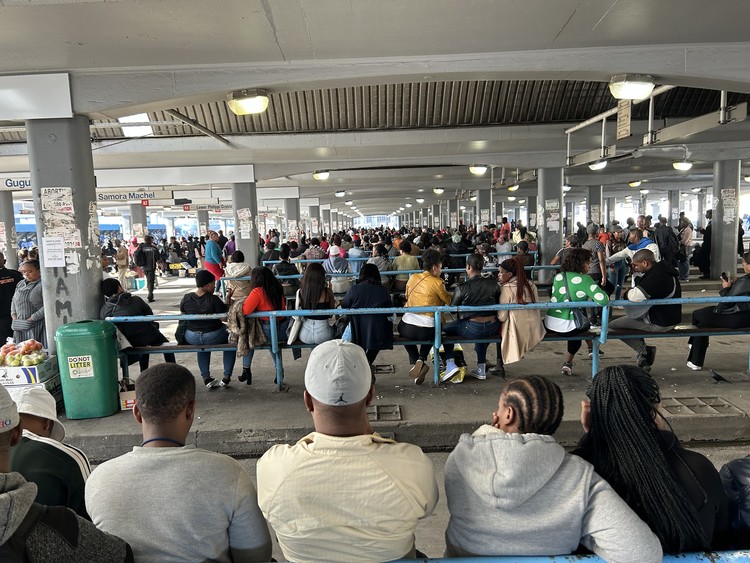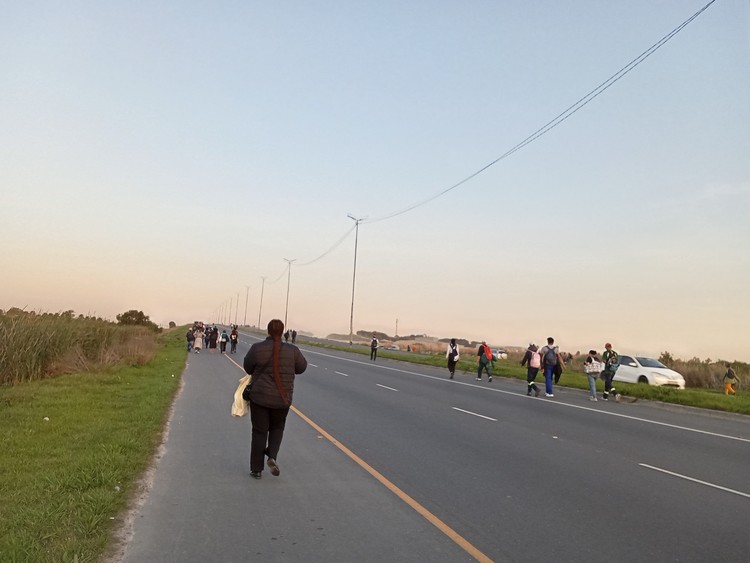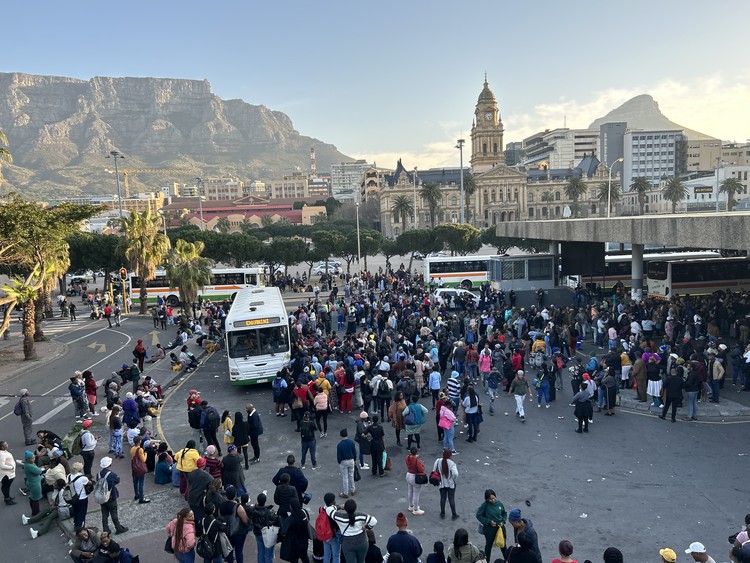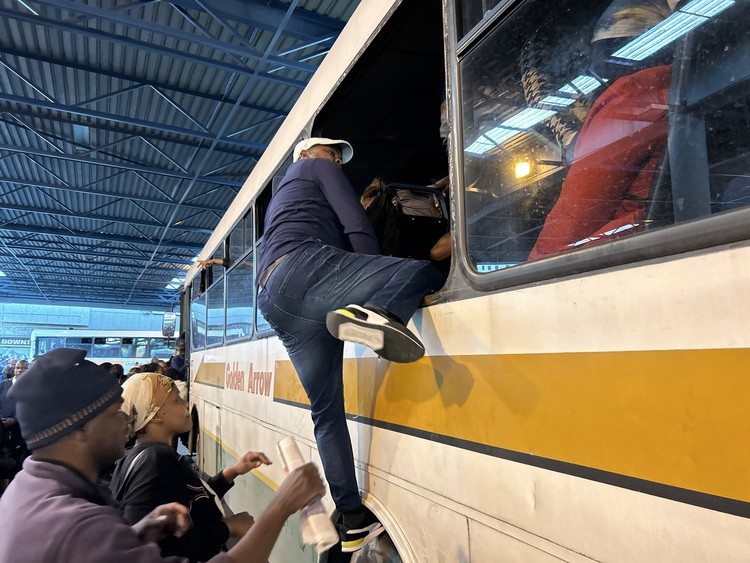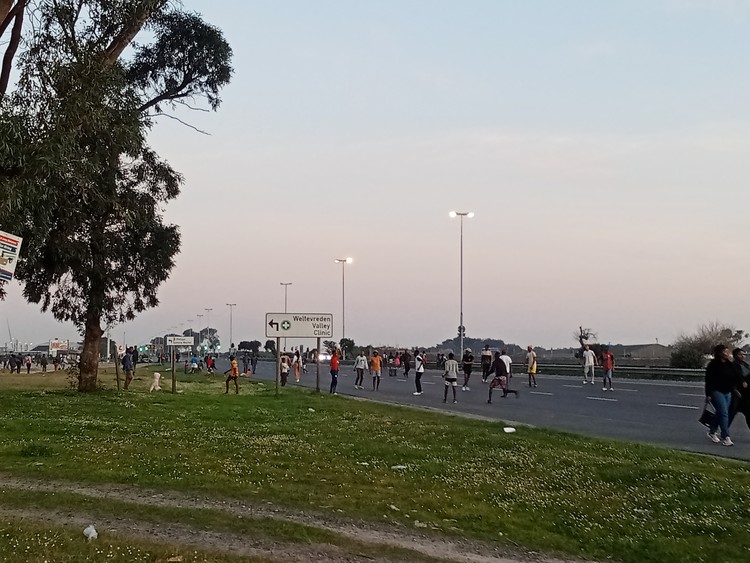Thousands of commuters stranded, vehicles petrol bombed and traffic gridlocked as taxi strike causes chaos on Cape Town roads
City seeking urgent interdict against the taxi strike
Thousands of commuters wait at the taxi rank in Cape Town’s city centre just hours after taxi operators affiliated to SANTACO embarked on a strike on Thursday afternoon. Photo: Matthew Hirsch
Hundreds of taxi operators brought most parts of Cape Town to a standstill yet again on Thursday afternoon after negotiations between the South African National Taxi Council (SANTACO) and government over vehicle impoundment deadlocked.
Thousands of commuters were left stranded at taxi ranks across the city. There were chaotic scenes as people forced their way into buses in a desperate attempt to get home, while others who lived along railway routes that are currently operational rushed to catch a train out of the city.
This followed the SANTACO announcement on Thursday afternoon to withdraw services of all its taxi operators and drivers in the province. The strike is expected to run until 9 August.
Tensions between taxi operators and the City of Cape Town have been simmering for the last few weeks and finally boiled over with reports of incidents of violence and protesting. Taxi operators say they are at their wits end over the City’s new by-law that gives it power to impound vehicles rather than fining drivers for offences such as overloading, lack of registration plates, and not having valid licensing documents.
SANTACO published a statement saying: “6,000 taxis had been impounded this year, which paints a very clear picture” that there was “a deliberate attempt to destroy the taxi industry in the province with no regard to the impact that this action will have on the communities that we service.”
Meanwhile, Mayco Member for Safety and Security JP Smith, in a statement at 5:20pm, said “numerous vehicles had been set alight” and there had been sporadic incidents of stone throwing since SANTACO called the strike at 2pm. Smith said there were petrol bomb attacks on four buses, three trucks, and three panel vans and bakkies, and a soft drink delivery truck had been looted. He said a school had also been attacked.
He stated the mayor had asked him “to ensure that the violence caused by some in the public transport sector is met with an appropriate response”. He went on to state, “We will proceed with impounding 25 vehicles for every truck, bus, vehicle or facility that is burnt or vandalised.”
Commuters were asked to disembark from buses, e-hailing taxis and other transport on Jakes Gerwel Drive towards Mitchells Plain. Some people said they had walked all the way from town. Photo: Qaqamba Falithenjwa
Reporters on the ground
There were unconfirmed reports of several government branded vehicles being stoned, and buses being set alight in Nyanga, Samora Machel and Philippi East just hours after SANTACO called for the shutdown.
At 2pm, taxi drivers started leaving the Cape Town taxi rank, announcing that those trips would be the last for the day, warning commuters who were left standing at the rank to make other arrangements to get home.
Our reporter, Sandiso Phaliso, managed to squeeze into the second last taxi to Philippi. The late afternoon rush hour was far worse than usual. This reporter had to get out and walk about 10 kilometres home when it became evident that Japhta Masemola Drive was a no-go zone. Commuters on buses also had to get out and walk due to safety concerns.
“Unfortunately I cannot go to that road (Japhta Masemola Drive) because I will be putting your lives and mine in danger. I am turning back,” the taxi driver told us. The driver was constantly on his cellphone with his colleagues who warned him of dangers along different routes.
Commuter Nolubabalo Khowane said he failed to understand why people were stoning cars as it could be their relatives in the car or bus.
At about 4pm, GroundUp arrived at the taxi rank in Cape Town’s city centre and saw hundreds of people waiting in snaking lines, with no taxis in sight. Some commuters said they had been waiting for as long as four hours to get home.
Commuters said no officials had informed them what was going on, nor whether taxis were still coming. Some also had young children waiting for them at daycare or were home alone. Many people who heard of the taxi strike made their way to bus terminals and the train station.
At the Cape Town train station a Metrorail security guard said they were anxious because more people than usual were trying to get onto the trains and were pushing and shoving to get into carriages.
Many people desperate to get home, flocked to buses. Photo: Matthew Hirsch
At the Golden Arrow terminus people scrambled to get into buses. In one scene, men scaled the side of a bus to get in through a window that had been kicked out. Hundreds of people were waiting in line for the next bus to arrive. Golden Arrow drivers appeared to be calm despite the desperate situation, although some said they were scared to drive to certain areas where violence was likely to happen, according to commuters.
Zandile Tyabeka, from Gugulethu, was waiting in line and anxious to get home to her two-month-old baby who was still at creche. “I have no idea how I will get home or how I will get back to work again tomorrow morning. There is no one else to look after my child,” she said.
Another commuter, Sakhele Myoko from Driftsands, said he did not think he would be able to get back to work in the morning if the taxis remained on strike.
Law enforcement and SAPS were still on the ground at various transport hubs and hotspots, monitoring the situation.
Desperate commuters climb through a bus window at Cape Town’s Golden Arrow bus terminus. Video: Matthew Hirsch
By 7pm the situation in the city centre had begun to calm down, but there were still hundreds of people waiting for transport.
In Wynberg, hundreds of people also waited at the terminus during rush hour. A long queue of people stood at the taxi rank hoping to catch a taxi, many had been waiting for over an hour with no other means to get home.
Tabisa Tyhopo, who had been waiting for over two hours with her 15-year-old son, said she usually took the bus home to Gugulethu. “We don’t have any options,” she said.
Tyhopo said she’d heard about the strike but didn’t know just how bad it would be. “People are upset,” she said, adding that now they had to spend a lot of money to take an Uber home.
The bus terminal which serves areas that include Khayelitsha, Samora Machel, Delft and Philippi, was completely empty. Zukiswa Mdledle, who had waited for over an hour, said usually the bus terminal was crawling with people. She said she felt stranded in Wynberg, where she works.
Some people have even resorted to walking all the way home, Mdledle said. She said she didn’t know there would be a taxi strike.
There were no traffic officers or law enforcement in sight.
People were so desperate to get home on Thursday evening, they resorted to climbing through the windows of buses to secure a seat. Photo: Matthew Hirsch
Government’s responses
Earlier in the day, during a media briefing meeting with Smith, Mayco Member for Urban Mobility Rob Quintas and provincial community safety minister Allen Reegan, Quintas announced that the N2 MyCiTi Express service between the city and Khayelitsha, and the Dial-a-Ride service for people with special needs, had been suspended.
Western Cape Premier Alan Winde urged taxi leaders to return to the table and work with the Western Cape government and the City to resolve long-standing issues that have confronted the industry.
“We recognise the important role the minibus taxi sector plays in the public transport industry and economy. But calling a strike that has been accompanied by violence is not the answer to resolving the grievances of operators and drivers. This will be a blow to our shared economic growth and will impact the poor the hardest,” he said.
“We are currently investigating legal action against the minibus taxi associations to interdict the violence associated with the strike. It is wholly unacceptable,” said Winde.
Many people on Jakes Gerwel Drive opposite the entrance to Samora Machel. Photo: Qaqamba Falithenjwa
In a press statement at 4pm Quintas said it was “simply not true” that the City was targeting minibus taxi operators. “Instead, we find that some minibus taxis are unroadworthy, have a record of dangerous traffic violations, drivers do not have a basic driver’s licence, and some of their vehicles are linked to criminal investigations.”
Cape Town Mayor Geordin Hill-Lewis, in a statement about 45 minutes later, also condemned “the violence and lawlessness associated with the SANTACO strike action”.
SANTACO Western Cape chairperson Mandla Hermanus said his organisation was demanding a review of the by-laws under which taxis are impounded and a commitment by the provincial government to support formalisation efforts by the taxi industry.
The strike is expected to continue until next week.
Next: Stalled Limpopo bulk water project leaves 100 homes without tap water
Previous: MyCiTi the focus of Cape Town’s new public transport business plan
© 2023 GroundUp. This article is licensed under a Creative Commons Attribution-NoDerivatives 4.0 International License.
You may republish this article, so long as you credit the authors and GroundUp, and do not change the text. Please include a link back to the original article.
We put an invisible pixel in the article so that we can count traffic to republishers. All analytics tools are solely on our servers. We do not give our logs to any third party. Logs are deleted after two weeks. We do not use any IP address identifying information except to count regional traffic. We are solely interested in counting hits, not tracking users. If you republish, please do not delete the invisible pixel.

